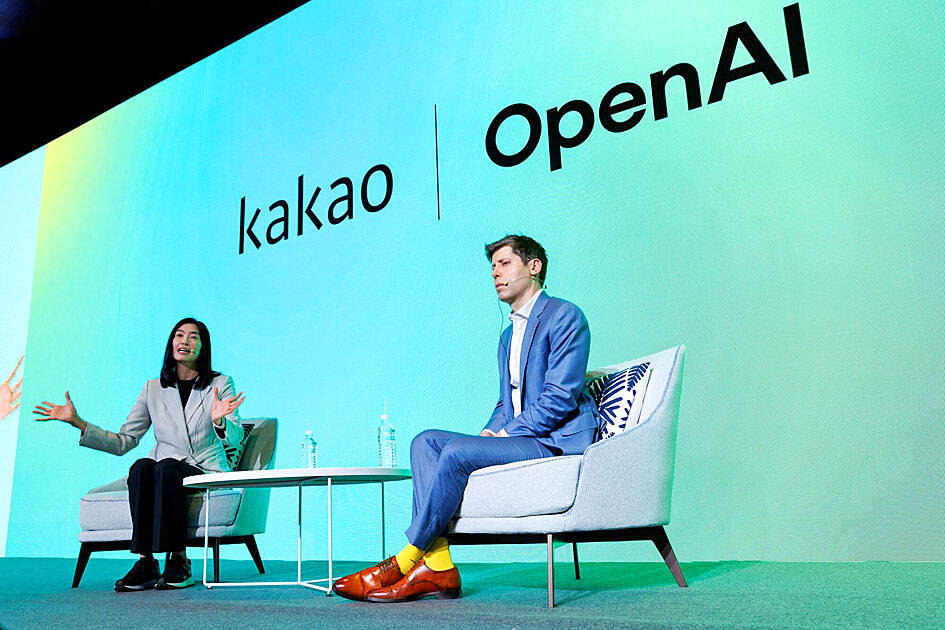OpenAI yesterday said it would develop artificial intelligence (AI) products for South Korea with chat app operator Kakao Corp, unveiling a second major alliance with a high-profile Asian partner this week.
In a whirlwind tour through Asia, OpenAI CEO Sam Altman on Monday announced a partnership with Japan’s Softbank Group Corp and is, according to sources, scheduled to visit India today where he is seeking to meet Indian Prime Minister Narendra Modi.
Like Softbank, Kakao said it would be using technology developed by the ChatGPT creator for its products.

Photo: Bloomberg
Kakao operates South Korea’s dominant messaging app KakaoTalk, which has a commanding 97 percent domestic market share and has expanded into areas such as e-commerce, payments and gaming. It has positioned AI as a new engine of growth, but analysts said it has lagged behind local rival Naver Corp in the AI race.
“We are particularly interested in AI and messaging,” Altman told a joint news conference with Kakao CEO Shina Chung in Seoul.
Altman also said that many South Korean companies would be important contributors to the Stargate data center project, a venture between OpenAI and Oracle Corp to build AI capacity in the US.
He declined to elaborate, saying he wants to keep partnership conversations confidential.
The OpenAI CEO met SK Group chairman Chey Tae-won earlier yesterday. He also planned to meet Samsung chairman Jay Y. Lee and Softbank Group CEO Masayoshi Son in Seoul later in the day, the Maeil Business Newspaper reported.
Son yesterday told reporters that he would be discussing updates on Stargate and “potential cooperation” with Samsung, as he was entering Samsung’s office in Seoul.
Asked whether he would request Samsung’s investment in the project, he said: “Nothing specific,” adding that they have to start cooperation talks.
SK Hynix and Samsung Electronics produce high-bandwidth memory chips used in AI processors.
Samsung and Softbank declined to comment on the meeting.
Last month, US President Donald Trump announced private sector investment of up to US$500 billion to fund AI infrastructure, saying that the market for AI products was growing “super fast.”
Asked whether OpenAI was looking at joining and investing in South Korea’s AI computing center project, Altman said the US company was “actively considering” such a move.
Last month, the South Korean government said it planned to build a national AI computing center for the Stargate data center project.
“There is so much happening in Korea that will be critical for that,” Altman said.
He added that South Korean energy, semiconductor and Internet companies made the country an important market for OpenAI, adding that South Korean demand would draw on investment from the public and private sectors worth up to 2 trillion won (US$1.4 billion).

Taiwan’s rapidly aging population is fueling a sharp increase in homes occupied solely by elderly people, a trend that is reshaping the nation’s housing market and social fabric, real-estate brokers said yesterday. About 850,000 residences were occupied by elderly people in the first quarter, including 655,000 that housed only one resident, the Ministry of the Interior said. The figures have nearly doubled from a decade earlier, Great Home Realty Co (大家房屋) said, as people aged 65 and older now make up 20.8 percent of the population. “The so-called silver tsunami represents more than just a demographic shift — it could fundamentally redefine the

Businesses across the global semiconductor supply chain are bracing themselves for disruptions from an escalating trade war, after China imposed curbs on rare earth mineral exports and the US responded with additional tariffs and restrictions on software sales to the Asian nation. China’s restrictions, the most targeted move yet to limit supplies of rare earth materials, represent the first major attempt by Beijing to exercise long-arm jurisdiction over foreign companies to target the semiconductor industry, threatening to stall the chips powering the artificial intelligence (AI) boom. They prompted US President Donald Trump on Friday to announce that he would impose an additional

China Airlines Ltd (CAL, 中華航空) said it expects peak season effects in the fourth quarter to continue to boost demand for passenger flights and cargo services, after reporting its second-highest-ever September sales on Monday. The carrier said it posted NT$15.88 billion (US$517 million) in consolidated sales last month, trailing only September last year’s NT$16.01 billion. Last month, CAL generated NT$8.77 billion from its passenger flights and NT$5.37 billion from cargo services, it said. In the first nine months of this year, the carrier posted NT$154.93 billion in cumulative sales, up 2.62 percent from a year earlier, marking the second-highest level for the January-September

Asian e-commerce giant Shein’s (希音) decision to set up shop in a historic Parisian department store has ruffled feathers in the fashion capital. Anger has been boiling since Shein announced last week that it would open its first permanent physical store next month at BHV Marais, an iconic building that has stood across from Paris City Hall since 1856. The move prompted some French brands to announce they would leave BHV Marais, but the department store had already been losing tenants over late payments. Aime cosmetics line cofounder Mathilde Lacombe, whose brand was among those that decided to leave following